

Wellbeing and Poverty Pathways Project : Bath University, UK. International Development Studies. Zambia_Round_2_Report_FINAL.pdf. Wellbeing and Poverty Pathways Project : Bath University, UK. This report sets out the 'pre-story' of our approach to wellbeing assessment and highlights findings that in Zambia, while economic status makes the greatest difference to inner wellbeing, gender/marital status comes a close second.

The report provides an overview of our findings on objective and subjective aspects of wellbeing in Chiawa, Zambia, from our first round of fieldwork there. It discusses the methodology we have developed to assess wellbeing, the pitfalls we encountered and how we addressed them. Finally, the report reflects on some of the ways that our results from Zambia confirm or contrast with those from our research in India, set out in a sister report.
Wellbeing and Poverty Pathways Project : Bath University, UK. Wellbeing and Poverty Pathways Project : Bath University, UK. Wellbeing and Poverty Pathways Project : Bath University, UK. Wed19.pdf. Wellbeing and Poverty Pathways Project : Bath University, UK. Ed Diener, Subjective Well-Being. Psychology, College of LAS, University of Illinois. Dr Dena Freeman - People - Anthropology. Dr Dena Freeman is a specialist in Southern Ethiopia.
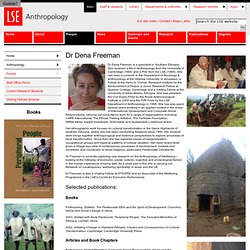
She received a BA in Anthropology from the University of Cambridge (1994) and a PhD from the LSE (1999). She has been a Lecturer in the Department of Sociology & Anthropology at the Hebrew University of Jerusalem, a Fellow at the Harry S. Truman Research Institute for the Advancement of Peace, a Junior Research Fellow at Queens' College, Cambridge and a Visiting Fellow at the University of Addis Abeba, Ethiopia. She was awarded the Curl Essay Prize by the Royal Anthropological Institute in 2000 and the Firth Prize by the LSE Department of Anthropology in 1998. Gross National Happiness: Practice and Measurement.
Proceedings of the Fourth International Conference on Gross National Happiness Edited by Dasho Karma Ura and Dorji Penjore This publication is the proceedings of the Fourth International Conference on Gross National Happiness held in Thimphu, Bhutan, from 24 to 26 November 2008, against the backdrop of the global financial crisis.
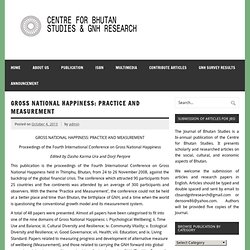
The conference which attracted 90 participants from 25 countries and five continents was attended by an average of 300 participants and observers. Annotated Bibliographies. Summary: This handout provides information about annotated bibliographies in MLA, APA, and CMS.

Contributors: Geoff Stacks, Erin Karper, Dana Bisignani, Allen BrizeeLast Edited: 2018-02-09 12:16:53 Stem Cell Research: An Annotated Bibliography Holland, Suzanne. The Human Embryonic Stem Cell Debate: Science, Ethics, and Public Policy. This is the annotation of the above source, which is formatted according to MLA 2016 (8th ed.) guidelines for the bibliographic information listed above. After a brief summary, it would be appropriate to assess this source and offer some criticisms of it. The length of your annotation will depend on the assignment or on the purpose of your annotated bibliography. BEYOND SUBJECTIVE WELL-BEING: A CRITICAL REVIEW OF THE STIGLITZ REPORT APPROACH TO SUBJECTIVE PERSPECTIVES ON QUALITY OF LIFE - White - 2012 - Journal of International Development.
Wellbeing and Poverty Pathways Project : Bath University, UK. DEV UG dissertation list - 1.34501!dev ug dissertation list.pdf. Sarah White. Sarah White is a sociologist concerned with international development and wellbeing.
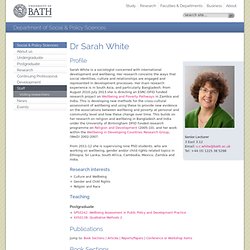
Her research concerns the ways that social identities, culture and relationships are engaged and represented in development processes. Her main research experience is in South Asia, and particularly Bangladesh. From August 2010-July 2013 she is directing an ESRC-DFID funded research project on Wellbeing and Poverty Pathways in Zambia and India. This is developing new methods for the cross-cultural assessment of wellbeing and using these to provide new evidence on the associations between wellbeing and poverty at personal and community level and how these change over time. This builds on her research on religion and wellbeing in Bangladesh and India under the University of Birmingham DFID funded research programme on Religion and Development (2005-10), and her work within the Wellbeing in Developing Countries Research Group, (WeD) 2002-2007. Book Sections White, S., 2013. White, S., 2011. White, S.
Local Knowledge: Further Essays In Interpretive Anthropology - Clifford Geertz. Culture and Subjective Well-being Well-being & Qualtiy of Life Well Being and Quality of Life: Amazon.co.uk: Ed Diener. The question of what constitutes the good life has been pondered for millennia.

Yet only in the last decades has the study of well-being become a scientific endeavor. Wellbeing and Poverty Pathways Project : Bath University, UK. International Differences in Well-Being Oxford Positive Psychology Series: Amazon.co.uk: Ed Diener, Daniel Kahneman, John Helliwell. By Michael B.

Frisch - Published on Amazon.com This seminal book could also be called:State of the Art in Well-Being Theory and ResearchOrBuilding a Better Microscope--Nobel Laureate Daniel Kahneman likens our ability to assess the happiness of whole nations and the world to the invention of the microscope by Dutch eyeglass makers in 1590. "Instruments" like the Gallup World Poll have opened our eyes to the well-being of nations; adjust the "power" and divine the well-being of individual citizens. This is to say that this book is also for those interested in individual well-being, including many positive psychologists, therapists, coaches, and researchers.
DEV UG dissertation list - 1.34501!dev ug dissertation list.pdf. J. Allister McGregor - Institute of Development Studies. Jccvita.pdf (application/pdf Object) Easterlin paradox. The Easterlin Paradox is a key concept in happiness economics.
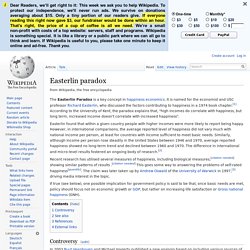
It is named for the economist and USC professor Richard Easterlin, who discussed the factors contributing to happiness in a 1974 book chapter.[1] According to the University of Kent, the paradox explains that, "high incomes do correlate with happiness, but long term, increased income doesn't correlate with increased happiness". Easterlin found that within a given country people with higher incomes were more likely to report being happy. However, in international comparisons, the average reported level of happiness did not vary much with national income per person, at least for countries with income sufficient to meet basic needs. Similarly, although income per person rose steadily in the United States between 1946 and 1970, average reported happiness showed no long-term trend and declined between 1960 and 1970.
World Bank’s annual World Development Report (WDR) Introduction People from many cultures seem to share a concern for equity that is reflected in religious and philosophical traditions, as well as in legal institutions, both national and international.
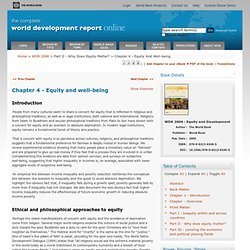
Religions from Islam to Buddhism and secular philosophical traditions from Plato to Sen have shown both a concern for equity and an aversion to absolute deprivation. SUBJECTIVE WELL-BEING ACROSS CULTURES: « Cross Cultural Psychology « Psychology « CkBooks Online – Free Online Books. Introduction: All individuals strive to be happy.

How they pursue this ultimate human goal, however, seems to vary in interesting ways across cultures. Have you ever thought about how happy you are with your life? “Of course!” Might be the immediate reaction of people who have lived most of their lives in highly individualist Western cultures. Culture and Subjective Well-Being. Quality of life. Well-being or welfare is a general term for the condition of an individual or group, for example their social, economic, psychological, spiritual or medical state; high well-being means that, in some sense, the individual or group's experience is positive, while low well-being is associated with negative happenings. In economics, the term is used for one or more quantitative measures intended to assess the quality of life of a group, for example, in the capabilities approach and the economics of happiness.
Like the related cognate terms 'wealth' and 'welfare', economics sources may contrast the state with its opposite.[1] The study of well-being is divided into subjective well-being and objective well-being. Background[edit] Cognitive[edit] Personality psychology. Personality psychology is a branch of psychology that studies personality and its variation between individuals. Its areas of focus include: Construction of a coherent picture of the individual and his or her major psychological processesInvestigation of individual psychological differencesInvestigation of human nature and psychological similarities between individuals "Personality" is a dynamic and organized set of characteristics possessed by a person that uniquely influences his or her cognitions, emotions, motivations, and behaviors in various situations.
The word "personality" originates from the Latin persona, which means mask. Positive psychology. To Martin Seligman, psychology (particularly its positive branch) can investigate and promote realistic ways of fostering more joy in individuals and communities. Positive psychology is a recent branch of psychology whose purpose was summed up in 1998 by Martin Seligman and Mihaly Csikszentmihalyi: "We believe that a psychology of positive human functioning will arise, which achieves a scientific understanding and effective interventions to build thriving individuals, families, and communities. Life satisfaction. Life satisfaction and personality[edit] Life satisfaction can reflect experiences that have affected a person in a positive way. These experiences have the ability to motivate people to pursue and reach their goals.[1] There are two emotions that may affect how people perceive their lives. Subjective well-being. Components[edit] There are 2 components of SWB.
One is Affect Balance and the other is Life Satisfaction. An individual's scores on the 2 measures are summed to produce a total SWB score. In some cases, these scores are kept separate.[8] Affect balance[edit] Affect balance refers to the emotions, moods, and feelings a person has. Life satisfaction[edit] Measuring SWB[edit] Bookmarkable URL intermediate page. Development As The Pursuit of Human Wellbeing - Institute of Development Studies. Chiawa_BP_final18_Dec_2013.pdf. Sarah White 16 June.pdf. Watson Institute for International Studies. Biography Catherine Lutz is the Thomas J. Watson, Jr. Professional Binding Services. Hard Binding We guarantee our 5 hour service at all times but you can also choose a longer service. There's no appointment needed; just come in to our Camden Street store or email over your PDF when you're ready to go. Please see below for our printing prices and our FAQ section for more information. These prices are for our standard leatherette covers but we can also bind with a buckram material for 10% extra.
Soft Binding We offer a wide range of soft bindings. Printing We can also provide the printing of your thesis. Please note that any page with colour will be considered a colour print as standard. Price Calculator Simply input your information below and click submit for an instant quote, based on the prices above for standard thesis binding. Ed Diener, Subjective Well-Being.